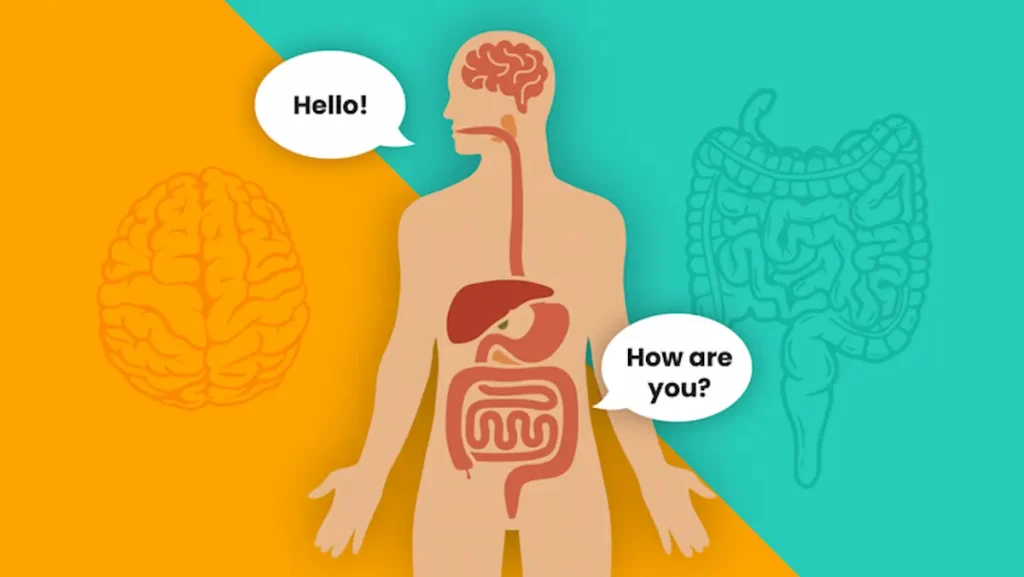In the quest to understand the intricate workings of the human body, researchers have uncovered a fascinating connection between our gut and our mood. This connection, often referred to as the “gut-brain axis,” sheds light on the profound influence our digestive system has on our emotional well-being. In this blog, we will explore the concept of how your gut is responsible for your mood, delving into the science behind it and how you can optimize your gut health for a happier and more balanced emotional state.
The importance of the gastrointestinal (GI) tract in human disease was first raised by Hippocrates more than 2000 years ago. His statement, that “all disease begins in the gut,” however, has only recently garnered significant interest. Although GI dysfunction has been reported to accompany an increasing number of disorders of the nervous system.

The relationship between the brain and the intestine, termed the “gut-brain axis,” begins during development and persists throughout life. It is what is thought to specifically link the emotional and cognitive centers of the brain with intestinal functions.
There is a bidirectional communication between the enteric nervous system (ENS) located in the walls of the gastrointestinal (GI) tract, and central nervous systems (CNS/brain). The enteric nervous system (ENS) is a massive mesh-like network of neurons that are embedded in the wall of your gastrointestinal tract. The ENS consists of some 500 million neurons and is also called the second brain.
Most of the signals (nearly 90%) flow from the gut to the brain. And these sensory signals have been found to be responsible for the mild mood swings to severe neuropsychiatric diseases.
The Gut-Brain Axis: Unraveling the Connection
The gut-brain axis is a complex communication network that links the gut, also known as the gastrointestinal system, to the central nervous system, which includes the brain. This intricate connection involves a range of factors that work in tandem to influence our mood.
The Enteric Nervous System (ENS)
At the heart of this connection lies the enteric nervous system (ENS), often referred to as the “second brain.” The ENS comprises a vast network of neurons within the gut that can communicate with the central nervous system through the vagus nerve. This bidirectional communication allows the gut to send signals to the brain, affecting our emotional state.
When the ENS detects disturbances in the gut, such as inflammation or digestive issues, it can transmit signals that trigger mood changes. This might explain why individuals with gastrointestinal disorders often experience symptoms of anxiety or depression, highlighting how your gut is responsible for your mood.
Gut Microbiota: Your Gut’s Tiny Inhabitants
The gut microbiota, a diverse community of microorganisms residing in your digestive tract, plays a pivotal role in how your gut is responsible for your mood. These microorganisms include bacteria, viruses, fungi, and more, collectively contributing to your gut’s overall health and its role in your mood.
Some of these microbes have the unique ability to produce neurotransmitters and chemicals that impact mood. Notably, certain gut bacteria are capable of synthesizing serotonin, a neurotransmitter closely associated with feelings of happiness and well-being. This connection between gut bacteria and serotonin production suggests that maintaining a healthy gut microbiome is essential for a positive mood.
Immune System: The Gut-Mood Connection
Your immune system is closely intertwined with your gut, and immune responses can have a significant influence on your mood. Inflammation, a common immune system reaction, can originate in the gut due to various factors like dietary choices or food sensitivities.
When the gut experiences inflammation, it can trigger changes in the brain that may lead to symptoms of depression or anxiety. This connection emphasizes the importance of a balanced gut to maintain emotional equilibrium.
Hormones and Neurotransmitters
Within the gut, hormones and neurotransmitters are synthesized, affecting both digestive processes and mood regulation. Hormones like ghrelin and leptin, responsible for regulating appetite, can also influence mood. An imbalance in these hormones may lead to emotional fluctuations, underscoring the relevance of how your gut is responsible for your mood.
Moreover, neurotransmitters like serotonin, dopamine, and GABA (gamma-aminobutyric acid) are closely associated with mood regulation and emotional well-being. The gut’s role in producing and modulating these neurotransmitters underscores its significance in shaping our emotional responses, reinforcing the concept of how your gut is responsible for your mood.
Nutrient Absorption: Fueling Your Mood
One often underestimated aspect of gut health is its role in nutrient absorption. The gut is responsible for extracting essential vitamins, minerals, and other nutrients from the food we consume. These nutrients are crucial for maintaining overall health, including our emotional well-being.
Deficiencies in key nutrients like vitamin D, B vitamins, and omega-3 fatty acids have been linked to mood disorders. Ensuring proper nutrient absorption through a well-balanced diet and optimal gut function is essential for maintaining a positive mood, further emphasizing how your gut is responsible for your mood.
Stress Response: Gut is Responsible for Your Mood
Stress is a common factor that can impact both gut health and mood. Stressful situations can disrupt gut function, leading to digestive discomfort or exacerbating existing gut conditions. Conversely, chronic gut issues can contribute to stress and anxiety, creating a feedback loop that affects both physical and emotional well-being, further underscoring how your gut is responsible for your mood.
Understanding the intricate relationship between your gut and your mood is the first step toward optimizing both aspects of your health. So, how can you support a healthier gut and, in turn, a more stable mood, considering how your gut is responsible for your mood?
Nurturing Your Gut for a Happier You
- Dietary Choices: A balanced and varied diet rich in fiber, fruits, vegetables, and probiotics can promote a healthy gut microbiome, supporting how your gut is responsible for your mood. Fermented foods like yogurt, kimchi, and kefir can introduce beneficial probiotics into your gut.
- Stress Management: Practice stress-reduction techniques such as meditation, deep breathing exercises, or yoga to help keep your gut-brain axis in harmony and manage how your gut is responsible for your mood.
- Regular Exercise: Physical activity has been shown to support a diverse gut microbiota and help reduce stress, contributing to a positive mood and further highlighting how your gut is responsible for your mood.
- Adequate Sleep: Prioritize quality sleep to ensure your body and brain have the opportunity to recover and restore balance, an essential element of how your gut is responsible for your mood.
- Limit Processed Foods: Reduce the consumption of processed foods, artificial sweeteners, and excessive sugar, which can disrupt gut health and negatively impact how your gut is responsible for your mood.
- Consult a Healthcare Professional: If you have persistent gut issues or mood disturbances, seek advice from a healthcare provider who can help identify and address underlying concerns related to how your gut is responsible for your mood.
Conclusion
In conclusion, your gut plays a pivotal role in influencing your mood through the intricate gut-brain axis, affirming how your gut is responsible for your mood. Recognizing the connection between gut health and emotional well-being empowers you to make informed choices to support both aspects of your health. By nurturing your gut through a healthy lifestyle and dietary choices, you can work toward a happier and more balanced you, with a profound understanding of how your gut is responsible for your mood at the center of it all.
So, the next time you feel upset in the morning, it might not be because you woke up on the wrong side of the bed, but because of what you ate the previous night.
Read also Gastroenterology in Chennai

